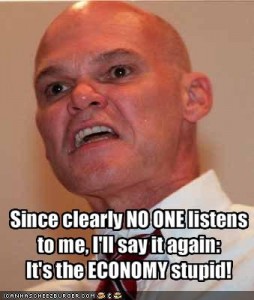 The Mission – Unexplainable Stories
The Mission – Unexplainable Stories
There’s a long-running debate about what is causing the coming Republican wave. The right wants to sell it as a judgment on the Obama agenda, as a re-assertion of the fundamental center-right nature of the American electorate freaking out about the policies the Democrats have pushed. The left tends to say that it’s simply the economy. You can guess based on this which side I come down on, but I want to explore the matter in a bit more detail because I think it’s important to see WHY the poles tend to see the arguments this way.
At stake is the question of whether all the seats Republicans pick up can be thought of as ‘rightly’ belonging to them, or whether the victory should be read as an accident of the historical moment—and the true sense of the electorate remains in the progressive camp.
The risk for the left in this argument is that it very easily spills over into accusations of false consciousness. In effect, if people claim that they prefer Republicans to Democrats, who are we to argue about what they REALLY mean?
I am sensitive to this, and I do think that sometimes the “it’s the economy, stupid” brigade tends to minimize the capacity for voters to actually make up their mind. There certainly is a lot to the macro-level political science argument that structural factors massively outweigh particular explanations. But it’s always important to remember that this is a large-scale explanation that does not work at a granular level. Structure doesn’t erase agency—although it absolutely does constrain it in less visible ways.
That said, it doesn’t take much digging into the polls to find evidence that the “it’s the economy, stupid” theory is pretty apt. Because on the whole voters still prefer the policies of Democrats to the Republicans and even think that Democrats are better on the economy. They just aren’t willing to use that preference as a guide for their voting behavior in this election.
Now, I personally think that’s an obnoxious and somewhat petulant way of approaching your vote—using it to send a signal of general dissatisfaction—but it’s a pretty easy one to grasp. And it doesn’t mean that people have suddenly seen the light on social conservatism or tax cuts for the wealthy. It doesn’t NOT mean that, perhaps. It might just be a null test of the whole hypothesis. We won’t really be able to judge it except in retrospect.
The other thing to remember here is that the overwhelming amount of evidence we get is NOT actually granulated. We “know” that there is a Republican wave building because of polling data – which is macro-level. We think we know about the wave because of all the stories about angry Tea Partiers and people at town halls and the like. But those are, in the grand scheme of things, very anecdotal. Reporters are stuck in a difficult space where they want to find a story, but they really don’t have any more access to the real macro-level information than any of the rest of us. So they tell very specific stories informed by specific motivations. And that means searching out for people telling stories about their votes that seem to validate particular narratives. But you’re really going to have trouble finding meaningful evidence for ANY narrative at this point in time.
I’m not saying there’s no value to highly specific, thick description of perspectives. I just think that when you try to employ anthropological tools to tell stories about broad social change and economic motivations you tend to run yourself into trouble. If we can let the two sit side by side in our minds, and not try to imagine that they are capable of speaking to precisely the same story, then we’ll do just fine.
